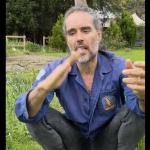2 Kings 19:29: Then this shall be the sign for you: you shall eat this year what grows of itself, in the second year what springs from the same, and in the third year sow, reap, plant vineyards, and eat their fruit.
Siege warfare in the ancient world was a dismal business. An invading army would not only attempt to enclose the population of a city within the walls, cutting off water and food until the city capitulated, but would also decimate the surrounding countryside as an additional preventative against supplies getting to the city.
This is the situation that this oracle of Isaiah imagines. The fortress cities of Judah have been destroyed, Sennacherib has marched all the way to the capital city, and along the way he has destroyed everything that grows. The promise from Yahweh, though, is that He will provide. Though the people of Judah have not been able to plant their crops and tend their vineyards, the Lord would cause the land to be fruitful. They will have plenty to eat – but not because of human effort. They will have food only by the grace of God. Sennacherib promised similar things: vineyards and fig trees, a land of grain, wine, oil, bread and honey. But Sennacherib’s promises are empty, as are all imperial offers.
This sign also alludes to the institution of the Jubilee. According to the law, Israel was supposed to give the land rest every seven years, and at the end of seven sets of seven years they were to celebrate a double Sabbath year called the Jubilee. Slaves would be freed, land would be returned to its owners, debts would be cancelled.
Jerusalem’s deliverance from Sennacherib is a Jubilee. The people of Judah were in danger of being enslaved by Sennacherib, but the Lord delivered them. They owed tribute to Sennacherib, but the Lord delivered them. They had lost their land to the Assyrians, but the Lord delivered the land back to them, and with the land He gave them good. In this, the deliverance from Assyria is a preview of the return from exile, when Israel would be released from Babylon to return to the land.
Jesus announced that He had come to bring in a cosmic Jubilee, of which the deliverance of Jerusalem was a type. Jesus came to release captives and proclaim liberty. He came to pay the debt that we could not pay. And, above all, He came to give the land back to the true heirs, the sons of Abraham, who was heir of the world. The great sign that this inheritance is now ours is this table. Jesus has released us from the captivity of sin, and He has given us the land. On the third day, He gave us the fruit of grain and vineyards so that we might eat their fruit.















